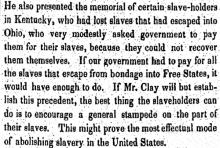WASHINGTON, Monday Evening,
April 22.
Business in the Senate–Petitions for Pay for Fugitive Slaves–Mr. Benton and the Compromise Committee–Charges against Mr. Ewing, in the House.
As I anticipated in my letter this morning, the proceedings of Congress have not been characterized by much interest or importance. The number in attendance in the Senate has been unusually small. Part of the time there were hardly more than a bare quorum of members present. The morning hour was taken up with the usual presentation of memorials, petitions, &c. &c. Mr. Clay presented a number of abolition petitions, at the same time protesting against their purport. He also presented the memorial of certain slave-holders in Kentucky, who had lost slaves that had escaped into Ohio, who very modestly asked government to pay them for their slaves, because they could not recover them themselves. If our government had to pay for all the slaves that escape from bondage into Free States, it would have enough to do. If Mr. Clay will but establish this precedent, the best thing the slaveholders can do is to encourage a general stampede on the part of their slaves. This might prove the most effectual mode of abolishing slavery in the United States.
After the presentation of these memorials, Mr. Benton obtained the floor, and moved a resolution of instructions to the Committee of Thirteen, that they should not, in their report, connect together any incongruous subjects in any bill they might report. Mr. Clay objected to his urging this resolution at the present moment, in the absence of the Senators, who had gone to South Carolina with the remains of Mr. Calhoun. Mr. Benton, however, said he had no intention to press the passage of the resolution then; his object was only to base upon it some remarks upon the propriety of connecting together in the same bill, subjects totally dissimilar. He then proceeded to argue, at length, and to quote from standard authorities upon the subject of parliamentary law, to show that such union of disconnected subjects was in violation of the common law that regulates such questions.
Mr. Clay intended to make no reply at present to Mr. Benton's position, but gave notice that he should reply to it when the subject came up again by the action of the committee itself.
Mr. Douglas afterwords moved an amendment to the bill for the admission of California, the effect of which is merely to secure to the United States its fee in the public lands of that State. It was received and ordered to be printed, without debate.
After which the Senate went into executive session upon certain appointments. It is understood that in the course of it, the appointment of Mr. Kinney, the accomplished editor of the Newark Daily Advertiser, to the chargeship at the court Sardinia, was confirmed.
The House has been busily engaged all the day in debating the propriety of investigating, by a select committee, certain charges made by anonymous and irresponsible newspaper paragraphs against Mr. Ewing, the Secretary of the Interior. The resolution was introduced by Richardson, of Illinois, and no objections having been made at the moment of its presentation, it was suffered to get before the House. Its impropriety was very plainly shown by several of the Whig members, but was finally carried by the votes of the free-soilers given with the Loco Focos. Afterwards the Census bill, as it has passed the Senate, was reported from the committee, with amendments, and made the order of the day for Wednesday and each succeeding day until it is disposed of.
T.M.B.
"Editorial Correspondence," Boston (MA) Daily Atlas, April 27, 1850, p. 2.

